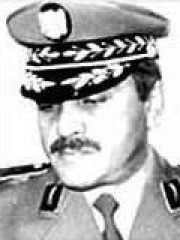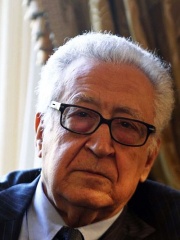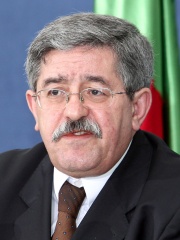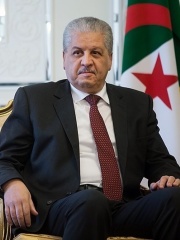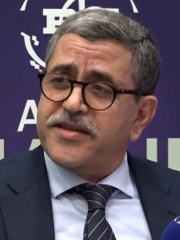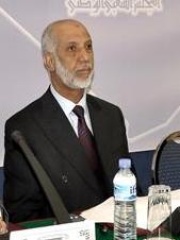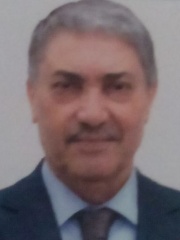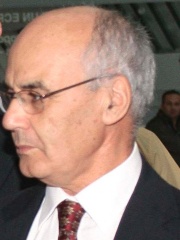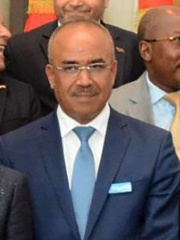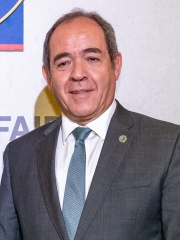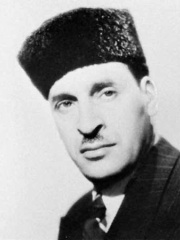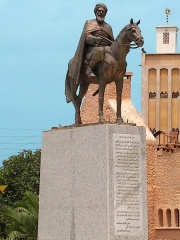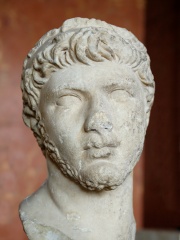
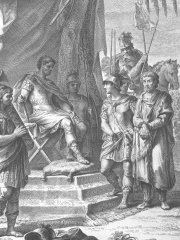
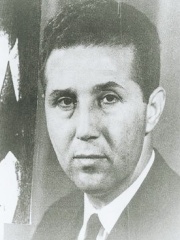
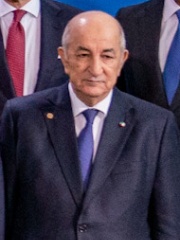
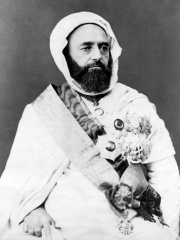
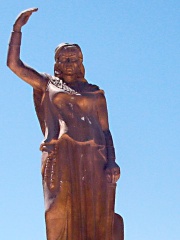

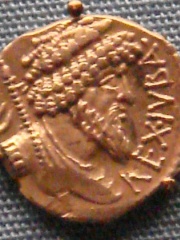
The Most Famous
POLITICIANS from Algeria
This page contains a list of the greatest Algerian Politicians. The pantheon dataset contains 19,576 Politicians, 50 of which were born in Algeria. This makes Algeria the birth place of the 66th most number of Politicians behind Cuba, and Lebanon.
Top 10
The following people are considered by Pantheon to be the top 10 most legendary Algerian Politicians of all time. This list of famous Algerian Politicians is sorted by HPI (Historical Popularity Index), a metric that aggregates information on a biography's online popularity. Visit the rankings page to view the entire list of Algerian Politicians.

1. Macrinus (164 - 218)
With an HPI of 81.02, Macrinus is the most famous Algerian Politician. His biography has been translated into 76 different languages on wikipedia.
Marcus Opellius Macrinus (; c. 165 – June 218) was a Roman emperor who reigned from April 217 to June 218, jointly with his young son Diadumenianus. Born in Caesarea (now called Cherchell, in modern Algeria), in the Roman province of Mauretania Caesariensis to an equestrian family of Berber origins, he became the first emperor who did not hail from the senatorial class and also the first emperor who never visited Rome during his reign. Before becoming emperor, Macrinus served under Emperor Caracalla as a praetorian prefect and dealt with Rome's civil affairs. He later conspired against Caracalla and had him murdered in a bid to protect his own life and succeeded Caracalla as emperor. Macrinus was proclaimed emperor of Rome by 11 April 217 while in the eastern provinces of the empire and was subsequently confirmed as such by the Senate; however, for the duration of his reign, he never had the opportunity to return to Rome. His predecessor's policies had left Rome's coffers empty and the empire at war with several kingdoms, including Parthia, Armenia, and Dacia. As emperor, Macrinus first attempted to enact reform to restore economic and diplomatic stability in Rome. While Macrinus' diplomatic actions brought about peace with each of the individual kingdoms, the additional monetary costs and subsequent fiscal reforms generated unrest in the Roman military. Caracalla's aunt, Julia Maesa, took advantage of the unrest and instigated a rebellion to have her fourteen-year-old grandson, Elagabalus, recognized as emperor. Macrinus was overthrown at the Battle of Antioch on 8 June 218 and Elagabalus proclaimed himself emperor with support from the rebelling Roman legions. Macrinus fled the battlefield and tried to reach Rome, but was captured in Chalcedon and later executed in Cappadocia. He sent his son to the care of Artabanus IV of Parthia, but Diadumenian was also captured before he could reach his destination and executed. After Macrinus' death, the Senate declared him and his son enemies of Rome and had their names struck from the records and their images destroyed, a procedure known as damnatio memoriae.

2. Jugurtha (160 BC - 104 BC)
With an HPI of 76.30, Jugurtha is the 2nd most famous Algerian Politician. His biography has been translated into 46 different languages.
Jugurtha or Jugurthen (c. 160 – 104 BC) was a king of Numidia, the ancient kingdom of the Numidians in northwest Africa. When the Numidian king Micipsa, who had adopted Jugurtha, died in 118 BC, Micipsa's two sons, Hiempsal and Adherbal, along with Jugurtha, were in line for succession. Jugurtha arranged to have Hiempsal killed in 117 BC and, after a civil war, defeated and killed Adherbal in 112 BC. The death of Adherbal, which was against the wishes of Rome, along with the growing popular anger in Rome at Jugurtha's success in bribing Roman senators and thus avoiding retribution for his crimes, led to the Jugurthine War between Rome and Numidia. After a number of battles in Numidia between Roman and Numidian forces, Jugurtha was captured in 105 BC and paraded through Rome as part of Gaius Marius' Roman triumph. He was thrown into the Tullianum prison, where he was executed by strangulation in 104 BC.

3. Ahmed Ben Bella (1916 - 2012)
With an HPI of 74.11, Ahmed Ben Bella is the 3rd most famous Algerian Politician. His biography has been translated into 68 different languages.
Ahmed Ben Bella (Arabic: أحمد بن بلّة, romanized: Aḥmad bin Billah; 25 December 1916 – 11 April 2012) was an Algerian politician, soldier and revolutionary who served as the head of government of Algeria from 27 September 1962 to 15 September 1963 and then the first president of Algeria from 15 September 1963 until his overthrow on 19 June 1965. Ben Bella played an important role during the Algerian war of independence against France, leading the National Liberation Front (FLN), organizing the shipment of foreign weapons and coordinating political strategy from Cairo. Despite not being present in Algeria, French authorities tried to assassinate him multiple times. Once Algeria gained independence in 1962, Ben Bella's Oujda Group seized power from Benyoucef Benkhedda's provisional government, and Ben Bella became prime minister of Algeria with Ferhat Abbas as acting president. Ben Bella succeeded Ferhat Abbas on 15 September 1963 after rapidly sidelining him, and was elected president after winning an election with 99.6 percent of the votes. Ben Bella pursued Arab socialist and pan-Arabist policies and came to describe himself as a Nasserist. He nationalized several industries and established good relations with other anti-Zionist Arab states and left-wing states such as Gamal Abdel Nasser's Egypt and Fidel Castro's Cuba. He encountered political conflict during his presidency, and was faced with border clashes in the Sand War with Morocco in 1963 and a failed rebellion by the Socialist Forces Front against his regime in 1963–1964. He was ousted from power and put under house arrest following a coup d'état by his Minister of Defense Houari Boumédiéne in 1965. He was freed from house arrest on January 17, 1980 and died in 2012.

4. Abdelmadjid Tebboune (b. 1945)
With an HPI of 73.58, Abdelmadjid Tebboune is the 4th most famous Algerian Politician. His biography has been translated into 61 different languages.
Abdelmadjid Tebboune (Arabic: عَبد الْمَجِيْد تَبُّون, romanized: ʿAbd al-Majīd Tabbūn; born 17 November 1945) is an Algerian politician currently serving as the president of Algeria since December 2019 and as minister of defence. Tebboune took over the power from former president Abdelaziz Bouteflika and former acting head of state Abdelkader Bensalah. Previously, he was Prime Minister of Algeria from May 2017 to August 2017. In addition, he was also minister of housing from 2001 to 2002 for a year and again from 2012 to 2017 for five years.
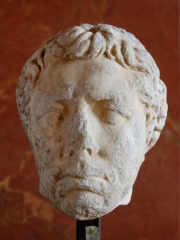
5. Juba II (52 BC - 23)
With an HPI of 73.52, Juba II is the 5th most famous Algerian Politician. His biography has been translated into 43 different languages.
Juba II of Mauretania (Latin: Gaius Iulius Iuba; Ancient Greek: Ἰóβας, Ἰóβα or Ἰούβας; c. 48 BC – AD 23) was the son of Juba I and client king of Numidia (30–25 BC) and Mauretania (25 BC – AD 23). Aside from his very successful reign, he was a highly respected scholar and author. His first wife and co-ruler was Cleopatra Selene II, daughter of Queen Cleopatra VII of Ptolemaic Egypt and Roman Triumvir Mark Antony.

6. Emir Abdelkader (1808 - 1883)
With an HPI of 73.36, Emir Abdelkader is the 6th most famous Algerian Politician. His biography has been translated into 69 different languages.
Abd al-Qadir ibn Muhyi al-Din (6 September 1808 – 26 May 1883; Arabic: عبد القادر ابن محي الدين ʿAbd al-Qādir ibn Muḥy al-Dīn), known as the Emir Abdelkader or Abd al-Qadir al-Hassani al-Jaza'iri, was an Algerian religious and military leader who led a struggle against the French colonial invasion of Algiers in the early 19th century. As an Islamic scholar and Sufi who unexpectedly found himself leading a military campaign, he built up a collection of Algerian tribesmen that for many years successfully held out against one of the most advanced armies in Europe. His consistent regard for what would now be called human rights, especially as regards his Christian opponents, drew widespread admiration, and a crucial intervention to save the Christian community of Damascus from a massacre in 1860 brought honours and awards from around the world. Within Algeria, he was able to unite many Arab and Berber tribes to resist the spread of French colonization. His efforts to unite the country against French invaders led some French authors to describe him as a "modern Jugurtha", and his ability to combine religious and political authority has led to his being acclaimed as the "Saint among the Princes, the Prince among the Saints".

7. Dihya (700 - 601)
With an HPI of 70.78, Dihya is the 7th most famous Algerian Politician. Her biography has been translated into 39 different languages.
Al-Kahina (Arabic: الكاهنة, romanized: al-Kāhina, lit. 'the priestess'), also known as Dihya, was a Berber warrior-queen of the Aurès (present-day Algeria) and a religious and military leader who lived during the seventh century AD/CE. Al-Kahina is known to have united various Berber tribes under her leadership to fight against the Muslim conquest of the Maghreb, leading the indigenous North African defense of the region then known as Numidia. She fought in multiple battles, notably defeating Umayyad forces in the Battle of Meskiana. Afterwards, she became the uncontested ruler of the whole Maghreb region, and remained so until being decisively defeated at the Battle of Tabarka. There are various accounts of the circumstances surrounding her death, but she is thought to have died in modern-day Algeria towards the end of the seventh century, or early 8th century. For five years Al-Kahina ruled a free Berber state from the Aurès Mountains to the oasis of Ghadames (698–703 AD). She is considered one of the most famous figures of her era in the history of the Berber resistance to the Arab conquest. Her legacy has been retold through the oral tradition since her lifetime. There are various written accounts of her from precolonial and postcolonial perspectives.

8. Princess Charlotte, Duchess of Valentinois (1898 - 1977)
With an HPI of 70.69, Princess Charlotte, Duchess of Valentinois is the 8th most famous Algerian Politician. Her biography has been translated into 27 different languages.
Princess Charlotte, Duchess of Valentinois (Charlotte Louise Juliette Grimaldi; 30 September 1898 – 16 November 1977), styled Hereditary Princess of Monaco between 1922 and 1944, was the daughter of Louis II, Prince of Monaco, and mother of Prince Rainier III. From 1922 until 1944, she was the Hereditary Princess of Monaco, heiress presumptive to the throne.

9. Juba I of Numidia (85 BC - 46 BC)
With an HPI of 70.53, Juba I of Numidia is the 9th most famous Algerian Politician. His biography has been translated into 33 different languages.
Juba I of Numidia (Latin: Iuba, Punic: ywbʿy; c. 85–46 BC) was a king of Numidia (present-day Algeria) who reigned from 60 to 46 BC. He was the son and successor to Hiempsal II.
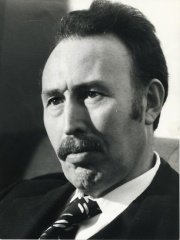
10. Houari Boumédiène (1932 - 1978)
With an HPI of 70.23, Houari Boumédiène is the 10th most famous Algerian Politician. His biography has been translated into 53 different languages.
Houari Boumédiène (Arabic: هواري بومدين, romanized: Hawwārī Būmadyan; born Mohammed ben Brahim Boukharouba; 23 August 1927 – 27 December 1978) was an Algerian military officer and politician who was the second head of state of independent Algeria from 1965 until his death in 1978. He served as Chairman of the Revolutionary Council of Algeria from 19 June 1965 until 12 December 1976 and thereafter as president of Algeria until his death. Born in Guelma, Mohammed ben Brahim Boukharouba was educated at the Islamic Institute in Constantine. In 1955, he joined the National Liberation Front (FLN) and adopted the nom de guerre Houari Boumediene. By 1960, he had risen through the organization's ranks to become the commander of the FLN's military wing. After the FLN's victory over the French in the Algerian War of Independence in 1962, Boumediene became the Minister of Defense in Algeria's new government. However, in June 1965, he overthrew President Ben Bella in a bloodless coup before proceeding to abolish Algeria's parliament along with its constitution and ultimately becoming the country's acting head of state. In the 1970s, Boumediene initiated a gradual restoration of parliamentarism and civil institutions in Algeria. This process ended with the adoption of the new constitution in 1976. The presidency was reinstated, and Boumediene emerged as the sole candidate in an election later that year, winning with 99.46 per cent of the votes. Subsequently, he pursued Arab socialist and Pan-Arabist policies. He was also strongly opposed to Israel and offered logistic assistance to anti-colonial movements and freedom fighters across the Arab world and Africa. From the beginning of 1978, Boumediene appeared less and less in public. He died on December 27, 1978, after unsuccessful treatment for a rare form of blood cancer, Waldenström's macroglobulinemia. His funeral was attended by two million mourners. He was succeeded as president by Chadli Bendjedid.
People
Pantheon has 50 people classified as Algerian politicians born between 250 BC and 1984. Of these 50, 14 (28.00%) of them are still alive today. The most famous living Algerian politicians include Abdelmadjid Tebboune, Liamine Zéroual, and Lakhdar Brahimi. The most famous deceased Algerian politicians include Macrinus, Jugurtha, and Ahmed Ben Bella. As of April 2024, 1 new Algerian politicians have been added to Pantheon including Sandra Laoura.
Living Algerian Politicians
Go to all RankingsAbdelmadjid Tebboune
1945 - Present
HPI: 73.58
Liamine Zéroual
1941 - Present
HPI: 65.66
Lakhdar Brahimi
1934 - Present
HPI: 61.99
Ahmed Ouyahia
1952 - Present
HPI: 61.86
Abdelmalek Sellal
1948 - Present
HPI: 61.46
Abdelaziz Djerad
1954 - Present
HPI: 59.24
Abdelaziz Belkhadem
1945 - Present
HPI: 58.33
Ali Benflis
1944 - Present
HPI: 58.04
Youcef Yousfi
1941 - Present
HPI: 57.41
Louisa Hanoune
1954 - Present
HPI: 53.87
Noureddine Bedoui
1959 - Present
HPI: 53.73
Sabri Boukadoum
1958 - Present
HPI: 52.20
Deceased Algerian Politicians
Go to all RankingsMacrinus
164 - 218
HPI: 81.02
Jugurtha
160 BC - 104 BC
HPI: 76.30
Ahmed Ben Bella
1916 - 2012
HPI: 74.11
Juba II
52 BC - 23
HPI: 73.52
Emir Abdelkader
1808 - 1883
HPI: 73.36
Dihya
700 - 601
HPI: 70.78
Princess Charlotte, Duchess of Valentinois
1898 - 1977
HPI: 70.69
Juba I of Numidia
85 BC - 46 BC
HPI: 70.53
Houari Boumédiène
1932 - 1978
HPI: 70.23
Ferhat Abbas
1899 - 1985
HPI: 69.77
Abd al-Mu'min
1094 - 1163
HPI: 69.22
Ptolemy of Mauretania
9 BC - 40
HPI: 68.77
Newly Added Algerian Politicians (2025)
Go to all RankingsOverlapping Lives
Which Politicians were alive at the same time? This visualization shows the lifespans of the 23 most globally memorable Politicians since 1700.

